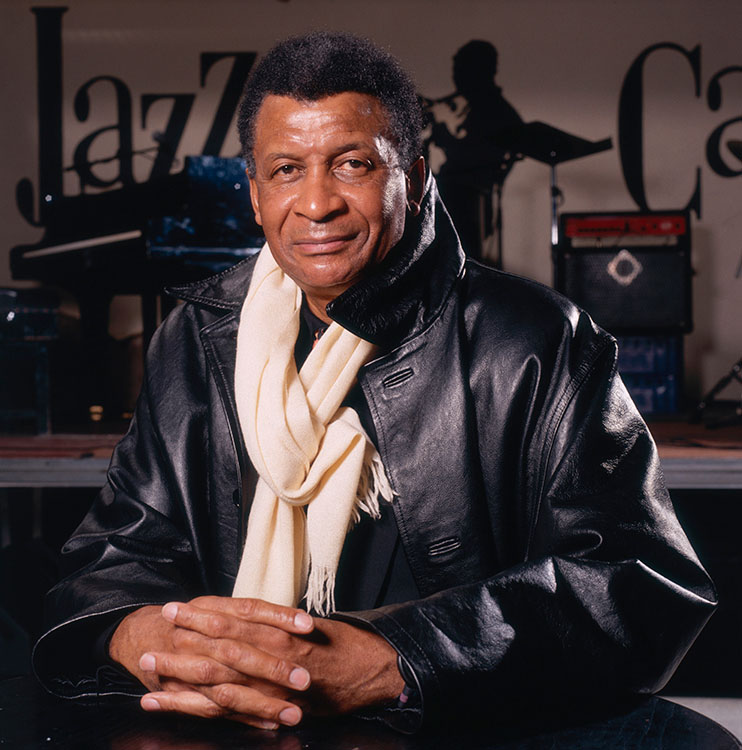Abdullah Ibrahim (Arabic: عبدالله إبراهيم), born Adolph Johannes Brand, 9 October 1934 in Cape Town, South Africa, and formerly known as Dollar Brand, is a South African pianist and composer. His music reflects many of the musical influences of his childhood in the multicultural port areas of Cape Town, ranging from traditional African songs to the gospel of the AME Church and ragas, to more modern jazz and other Western styles. Ibrahim is considered the leading figure in the sub-genre, Cape Jazz. Within jazz, his music particularly reflects the influence of Thelonious Monk and Duke Ellington. With his wife, the jazz singer Sathima Bea Benjamin, he is father to the New York underground rapper Jean Grae, as well as to a son, Tsakwe. He first received piano lessons at the age of seven, was an avid consumer of jazz records brought by American sailors, and was playing jazz professionally by 1949. In 1959 and 1960, he played alongside Kippie Moeketsi and Hugh Masekela with The Jazz Epistles in Sophiatown; the group recorded the first jazz LP by Black South African musicians in 1960. Ibrahim then joined the European tour of the musical King Kong. He moved to Europe in 1962. In February 1963, Ibrahim’s wife-to-be Sathima Bea Benjamin convinced Duke Ellington, who was in Zürich on a European tour, to come to hear Ibrahim perform as “The Dollar Brand Trio” in Zürich’s “Africana Club”. After the show, Ellington helped set up a recording session with Reprise Records: Duke Ellington presents The Dollar Brand Trio. A second recording of the trio (also with Duke Ellington and Billy Strayhorn on piano) performing with Sathima as vocalist was recorded, but remained unreleased until 1996 (A Morning in Paris under Benjamin’s name). The Dollar Brand Trio (with Johnny Gertze on bass and Makaya Ntshoko on drums) subsequently played at many European festivals, as well as on radio and television. He briefly returned to South Africa in the mid-1970s after his conversion to Islam (and the resultant change of name from Dollar Brand to Abdullah Ibrahim); however, he soon returned to New York in 1976, as he found the political conditions too oppressive. While in South Africa, however, he made a series of recordings with noted Cape Town players (including Basil Coetzee and Robbie Jansen). These seminal recordings gave impetus to a new sound, Cape Jazz. These included the masterpiece, “Mannenberg”, renamed “Capetown Fringe” in its US release, one of South Africa’s popular musical compositions; the recording soon became an unofficial soundtrack to the anti-apartheid resistance. “Black Lightning”, “African Herbs” and “Soweto is Where it is at”, sounds that mirrored and spoke of the defiance in the streets and townships of South Africa. Saxophonist and flautist Carlos Ward was his sideman in acclaimed duets during the early 1980s. Abdullah Ibrahim has written the soundtracks for a number of films, including the award-winning Chocolat and, more recently, No Fear, No Die. Since the ending of apartheid, he has lived in Cape Town, and now divides his time between his global concert circuit, New York, and South Africa. He also took part in the 2002 documentary Amandla!: A Revolution in Four-Part Harmony, where he and others recalled the days of apartheid. Ibrahim has worked as a solo performer, typically in mesmerising unbroken concerts that echo the unstoppable impetus of the old marabi performers, classical impressionists and snatches of his musical idols – Duke Ellington, Thelonious Monk and Fats Waller. He also performs regularly with trios and quartets and larger orchestral units. Since his return to South Africa in the early 1990s, he has been feted with symphony orchestra performances, one of which was in honour of Nelson Mandela’s inauguration as President. He has also founded the “M7” academy for South African musicians in Cape Town, and was the initiator of the Cape Town Jazz Orchestra, an 18-piece big band launched in September 2006. Ibrahim’s song “African Marketplace” has achieved such widespread popularity that the Swedish Communist Party always plays it at demonstrations and meetings. Ibrahim continues to perform internationally, mainly in Europe, and with occasional shows in North America. Ibrahim appeared in a television documentary in Japan that aired on June 26, 2010, on NHK-BS. In the program, he performed his compositions in several beauty spots in South Africa, playing a piano set on the ground that resonated deeply with the majestic natural surroundings. from wikipedia
